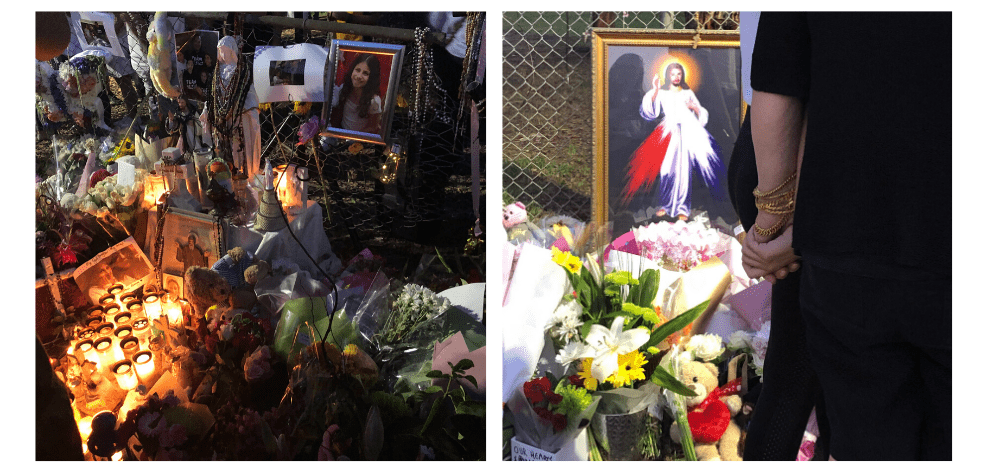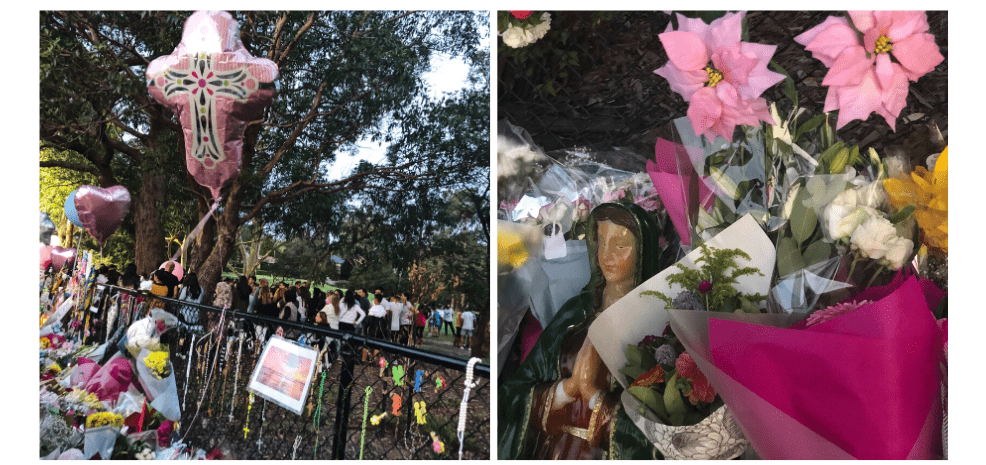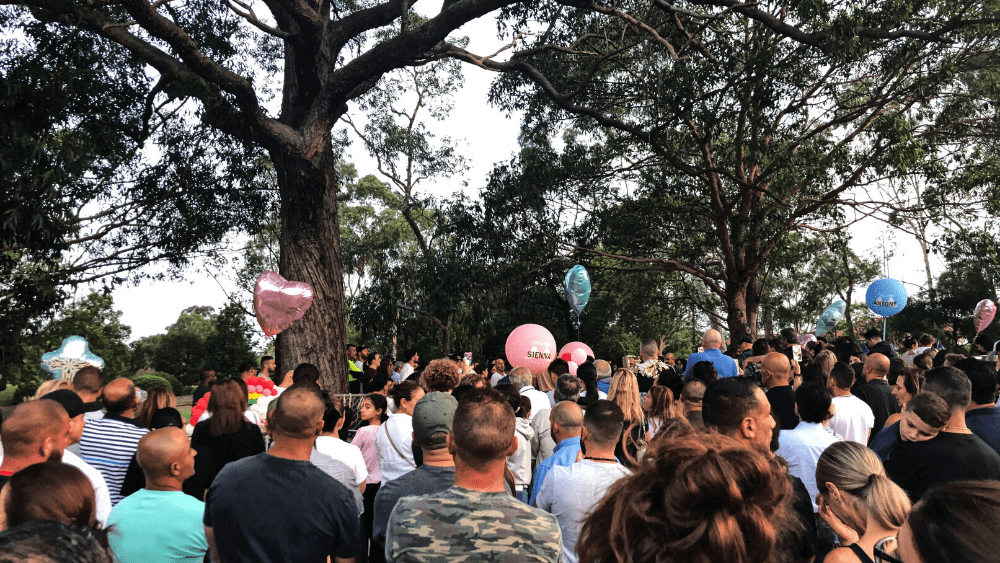When I leave Bettington Road, Oatlands at 8.45pm – the site of last Saturday’s horrific accident where Sienna (8), Angelina (12) and Antony Abdallah (13) and Veronique Sakr (11) were killed by the car of an allegedly drunk driver – Danny and Leila Abdallah are still there.
The prayer vigil in western Sydney has been over almost an hour. Starting at 7pm, the rosary and Lord’s Prayer were prayed over a PA and traditional Maronite Catholic hymns and contemporary worship songs were sung.
But Danny and Leila are still there, at the devastation site where they lost three kids and a niece. They are embracing people and thanking them for attending. It feels like they know everyone, but that’s just who they are.
Leila had hugged me, too – for a really long time, considering I’m someone she’s just met.
Her friend, Bernadette, introduced me as a journalist from a Christian newspaper. Leila told me she’s so glad I’ve come.
Is this not what Christianity is supposed to look like at times of tragedy?
Just twenty minutes earlier, she had folded herself up in front of the makeshift memorial erected for her three children. She had cried in a gut-wrenching display of undiluted grief. And then, less than half an hour later, she was on her feet in front of it, hugging everyone, along with the Christian reporter who she only just met.
Somehow, I found myself facing her and holding her around the waist like a close friend, with her arms around me as she thanked me.
Shocked by her generosity in the midst of such deep grief, I stumbled over my words. I tried to tell her how sorry I was for her loss. I think I managed to say something about it being an honour to meet her and express my gratitude for how well she and her husband are representing our shared Christian faith.
Bernadette and Leila have been friends since their children began attending primary school together around ten years ago.
As they hugged each other, Bernadette asked: “What can I do for you? Can I help you with taking the boys? What can I do for you?”
“I haven’t been eating, I haven’t been drinking,” Leila told Bernadette. “I’m fasting for my children.”
I assumed she was talking about her two children that are still hospitalised because the family’s been very clear that they believe the children who’ve passed are in a better place, in heaven, with Jesus.
The two women said “I love you” several times to each other. Bernadette told her she would always be there for her.
“Can I come for coffee with you tomorrow?” she had asked and Leila had answered, “Any time, you always can” in that automatic way of a woman whose home is always open to visitors.
Again, it was unexpected, given the circumstances and the site, to hear Leila extending hospitality so warmly. We were standing where her children were killed four nights ago. But though Leila is a woman grieving, she’s also a woman who is used to pastoring people.
Part of my brain was trying to tell me Leila must be acting out of shock. But the vigil also brought to mind recent examples from my own denominational tribe, Pentecostals, when a community sought to process the death of a child and onlookers simply couldn’t make sense of it.
Besides, I thought, isn’t this communal, shared grief while still holding on to hope in Christ? Is this not what Christianity is supposed to look like at times of tragedy?
I overheard Leila speaking to a guy who told her he had been coming back home around the time of the crash. She told him he is lucky he didn’t see one of the bodies she saw, because he would be traumatised for life (as she evidently is).
She’s living every parent’s worst nightmare, but she still somehow seems to be pastoring this guy in the conversation.
Another woman had fallen into Leila’s arms with tears, telling her how she lost her father the same day as the accident. Leila cared for her, too.

Bernadette reckons Leila should be the face of Christianity and represent us all. She describes her as God’s grace personified and says Leila never has a bad word to say about anyone.
I was hesitant when Bernadette led me into the park section behind the road’s flower-covered fence to meet Leila’s husband Danny. I mumbled something about “only if you think it’s appropriate”.
The truth is, I’d spent most of the day arguing with God about the assignment my editor had given me. I didn’t want to seem like the “vulture” reporter getting in the face of grieving parents.
But it was too late at that point. I was there for work and I’d prayed that God would help me do it well and here was Bernadette taking me behind the fence of flowers to meet Danny. Besides, Bernadette reassured me.
“This is the first time the media is writing a good story about Christians and not attacking us,” Bernadette said. “I just wish it didn’t take this for it to happen.”
On the other side of the fence, I met Daniel, the Abdallahs’ next door neighbour. He told me how Danny always says to him, “Find a girl who loves God and fears God.”
“That’s what he’s found and that’s what he tells me to find,” says Daniel. And living next door to what may be the loveliest family on earth, Daniel is also convinced.
“People are coming back to the Lord … It’s not in vain.” – Danny
Then I met Danny and he, just like Leila, was happy to know a Christian journalist was there. He said he wanted to talk to me properly. Bernadette promised to connect us the next day, when she would be at their place. I told him I was sorry for his loss and was overwhelmed by their witness. That they really have been able to provide a wonderful Christian testimony in the hardest of times.
Danny knew. He’s been hearing stories of God moving in the midst of the tragedy himself. He had shared one such story during the rosary service. One of his daughter’s friends has never believed in God because she had lost her mother. But following the accident she had a supernatural encounter when she was woken from her sleep and given the words of a poem. Danny read the poem aloud during the vigil. It included the lines “Six you were and six you will be … siblings forever and all as one…”
Danny had spoken to me like a sister in Christ, despite having met me exactly two minutes ago.
“People are coming back to the Lord,” he told me. “It’s not in vain. It’s not in vain.”
Earlier, Bernadette had shared with me a story of one of the staff at the childcare centre where her child and one of the Abdallah kids attend – an atheist who has begun to explore Christ in the aftermath of this tragedy. I wasn’t sure I believed her but less than five minutes later, en route to meet Danny, we ran into the childcare workers themselves who had attended the vigil.
“I just told her about how your workmate, the atheist, has turned to Christ now,” Bernadette said to one of the women as they talked.
I asked a few people whether they thought those attending the vigil knew the family in some way. Bernadette had looked around and said, “Oh yeah. They know many of the people here… but not all of them.”
One woman I spoke with, Natalie, told me her kids went to school with the Abdallahs. She’s devastated for Danny and Leila, but also proud of how the tragedy has brought out the best in their local community. We’d discussed the Headspace and Smiling Mind apps which can help children get to sleep after facing such trauma.

I also spoke to Jane, a Baptist woman who had come from the Hills District with a bunch of flowers to add to the sea of flowers, religious icons, toys, tributes and balloons bearing the children’s names which lined the roadside fence.
Jane and her family didn’t know the Abdallahs at all. They simply felt the same sense of connection many Australians did after learning their story through the media.
“It could have been any of our families,” her husband told me.
Jane and I had noted the sense of community at the vigil. She remarked that it has really brought Christians from different denominations together. I guess we were proof of that.
And yet, credit must be given where it’s due. Not all Christian communities would have rallied together when faced with such profound tragedy. This is a very Catholic response to grief. Yes, it’s Christian, but it’s also specifically Lebanese and Maronite and Catholic and Oatlands and North Parramatta and all the places where those communities touch and overlap.
Nobody needs to put on a brave face.
Many years ago, I read a quote by Eugene Petersen that said when we share someone’s grief, we confer dignity upon them. I was about to attend a funeral and felt very much out of my depth to provide the support I wanted to. But Petersen’s wisdom reassured me, providing me with a sense of purpose in the act of simply being present.
Those people who attended the prayer vigil in Oatlands – and who will continue to attend vigils this week – also understand the power of being physically present to share in grief.
Gathering together physically to grieve isn’t always possible. It hasn’t been possible for Australians this summer, for example, as we’ve collectively grieved the loss of lives, homes, bush and wildlife ravaged by bushfire. And just last week I attended a funeral where a friend had to read a eulogy written by his dad’s friend who had been quarantined at home for two weeks after returning from Hong Kong.
But this time, it was possible to gather.
Nobody needs to put on a brave face. This family and local community is unmistakably devastated by the loss of Sienna, Angelina and Antony Abdallah and Veronique Sakr. And yet, there is very real hope in the Lord here, too. The situation is both one hundred per cent grief, and one hundred per cent hope.
And the experience is undeniably dignifying for all.
Pray
Some prayer points to help
If you have read this story we trust you are praying for the Abdallah family, all those attending the nightly vigils in Bettington street, and all affected by this tragedy,



